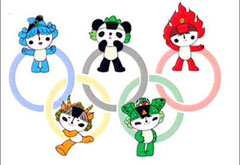“福娃”奥运史上象征意义最为丰富的吉祥物
(单词翻译:单击)
What does Fuwa represent?
吉祥物的首次“现身”是在1972年慕尼黑奥运会上,此后吉祥物便成为历届奥运会的重要形象代表。奥运吉祥物以其富有活力的独特形象深入人心,体现了奥林匹克精神、传达当届奥运会的举办理念以及主办城市的历史文化和人文精神,明年的北京 奥运会吉祥物“福娃”恐怕是奥运史上象征意义最为丰富的了,那么你知道它们都代表怎样的含义吗?
奥运会吉祥物“福娃”恐怕是奥运史上象征意义最为丰富的了,那么你知道它们都代表怎样的含义吗?

Fuwa are probably the most meaningful Olympic mascots1 in the history. Actually, when designers design them, they put many symbolic2 meanings into these five mascots that represent traditional culture and natural characteristics of China, which might be very difficult for foreigners to understand.
Basically, the name of the five Fuwa: "Beibei", "Jingjing", "Huanhuan", "Yingying" and "NIni" altogether in Chinese means welcome to Beijing. And they represent for five Olympic rings and also the five elements in Chinese philosophy. The five image of Fuwa come from the original shape of Chinese sturgeon, panda, Olympic flame, Tibetan antelope3 and swallow.
Beibei, passing the wish of flourish and harvest, it represents the blue ring and aquatic4 sports.
Jingjing is a lovely panda, it brings joy and happiness, Jingjing comes from the forest and symbolizes5 the harmonious6 coexistence between man and nature. It represents the black ring and strength sports.
Huanhuan is the eldest7 in the five, and it symbolized8 the Olympic sports spirit and the passion people have towards the Olympic Games. It symbolizes the red ring and ball games.
Yingying is an agile9 Tibetan antelope, it comes from the North-West of China and it is the rare and endangered species. Yingying represents the yellow ring and the athletics10 sports.
Nini comes from the sky, it is a swallow, and its image comes from the Chinese traditional kite and it is the symbolic image of Beijing. It represents the green ring and gymnastic sports.
Although Fuwa's meanings are various and hard for foreigners to understand, it is the feature of splendid Chinese culture and they give the information to the world--Welcome to Beijing!
 收听单词发音
收听单词发音
1
mascots

|
|
| n.吉祥物( mascot的名词复数 ) | |
参考例句: |
|
|
|
2
symbolic

|
|
| adj.象征性的,符号的,象征主义的 | |
参考例句: |
|
|
|
3
antelope

|
|
| n.羚羊;羚羊皮 | |
参考例句: |
|
|
|
4
aquatic

|
|
| adj.水生的,水栖的 | |
参考例句: |
|
|
|
5
symbolizes

|
|
| v.象征,作为…的象征( symbolize的第三人称单数 ) | |
参考例句: |
|
|
|
6
harmonious

|
|
| adj.和睦的,调和的,和谐的,协调的 | |
参考例句: |
|
|
|
7
eldest

|
|
| adj.最年长的,最年老的 | |
参考例句: |
|
|
|
8
symbolized

|
|
| v.象征,作为…的象征( symbolize的过去式和过去分词 ) | |
参考例句: |
|
|
|
9
agile

|
|
| adj.敏捷的,灵活的 | |
参考例句: |
|
|
|
10
athletics

|
|
| n.运动,体育,田径运动 | |
参考例句: |
|
|
|




